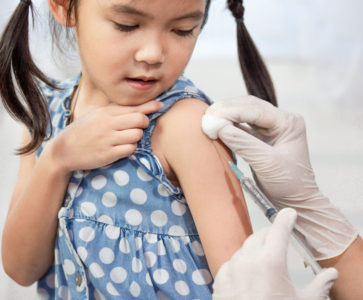 The COVID-19 vaccine has been available to all adults in the US for months now, and now researchers seem to be focusing more of their attention on ensuring a safe vaccine can be made for younger audiences. We all want to ensure our kids are safe, but could the vaccine end up doing more harm than good? We’re going to look at both sides of the coin, and our best piece of advice is to really do some research, read trusted and scientifically-backed sources, trust the opinion of medical experts you respect and do what you believe is the right move based on the accumulation of all this information.
The COVID-19 vaccine has been available to all adults in the US for months now, and now researchers seem to be focusing more of their attention on ensuring a safe vaccine can be made for younger audiences. We all want to ensure our kids are safe, but could the vaccine end up doing more harm than good? We’re going to look at both sides of the coin, and our best piece of advice is to really do some research, read trusted and scientifically-backed sources, trust the opinion of medical experts you respect and do what you believe is the right move based on the accumulation of all this information.
Vaccinating Our Kids
If there’s one bright spot about the coronavirus, it’s that it generally has a very limited effect on kids and teens. Their bodies are younger, healthier and their immune systems are better able to fight off the infection. And while the number is still too high, The Centers for Disease Control and Prevention report that a total of 226 children under the age of 18 have died from the virus. Of those, most have some sort of underlying medical condition that put them at a heightened risk for complications. One study even found that children without chronic conditions had a COVID-19 mortality rate of zero.
So by looking at that paragraph alone, one could reasonably argue that there’s little value to vaccinating a healthy child, but it’s not just about preventing death when it comes to COVID-19. Many pediatric COVID-19 infections have led to intensive care admissions and severe illness that brings about long-term health problems. Thousands of American kids have developed what’s known as multi-system inflammatory syndrome in children (MIS-C) due to COVID, which occurs in about 1 in 1,000 confirmed cases. The condition is rarely fatal, but it can be very painful and leave children with heart weakness and even neurological damage.
Aside from the health of a child, there’s also the impact a vaccine would have on other children. Those who cannot get the vaccine would be less likely to come in contact with a carrier if a larger portion of children were vaccinated. This could indirectly help to save lives and prevent complications from COVID-19.
On the other hand, is a dose for a healthy 6-year-old the best use of a vaccine when countless adults and at-risk groups still don’t have access worldwide? Would that dose be better saved for a 72-year-old diabetic in Uruguay as opposed to being used on a 6-year-old in America whose chances of dying from the virus are essentially nil?
At the end of the day, you will likely hear opinions on either side of the debate. There are merits for and against vaccinating a healthy child, and there is no one-size-fits-all answer. Each parent and guardian needs to do their own research into the individual benefits and drawbacks of seeking out a vaccine for their child. Keep your ear to the ground, follow the smart research, and do what’s best in your opinion for your family. If you have questions that you want answers to, be it about COVID-19 or a foot condition, reach out to Dr. Silverman’s office today.